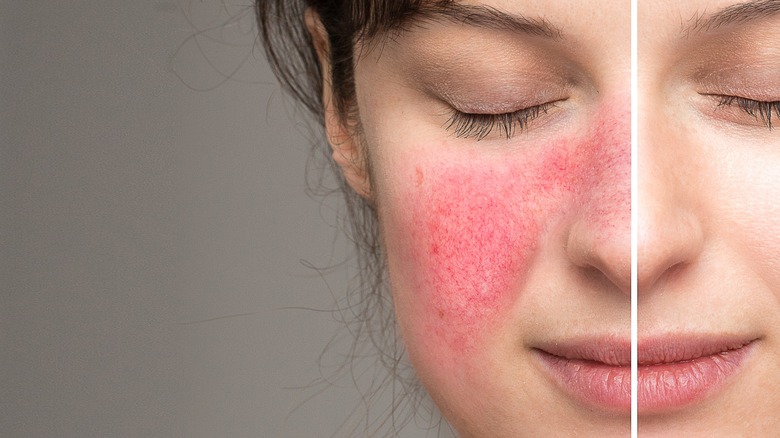Skincare ingredients to avoid with rosacea: Identify harmful ingredients, discover safe alternatives, and learn expert tips to keep your skin calm and irritation-free.
Table of Contents
- Introduction
- Understanding Rosacea
- Importance of Ingredient Awareness
- Common Triggers for Rosacea
- Environmental Factors
- Dietary Factors
- Skincare Ingredients to Avoid
- Alcohol
- Fragrances
- Menthol and Peppermint
- Retinoids
- Salicylic Acid
- Glycolic Acid
- Lactic Acid
- Witch Hazel
- Safe Skincare Practices for Rosacea
- Choosing Gentle Products
- Patch Testing
- Consulting a Dermatologist
- FAQs
- Can I use natural products with rosacea?
- How can I identify harmful ingredients?
- Are there any beneficial ingredients for rosacea?
- Conclusion
- Key Takeaways
- Final Recommendations
Skincare Ingredients to Avoid with Rosacea Intro
Understanding Rosacea
Rosacea is a chronic skin condition characterized by redness, visible blood vessels, and, in some cases, acne-like breakouts. It primarily affects the face and can be triggered by various factors, including skincare products.
Importance of Ingredient Awareness
For individuals with rosacea, being aware of skincare ingredients is crucial. Certain ingredients can exacerbate the condition, leading to flare-ups and discomfort. By avoiding these triggers, you can better manage your rosacea and maintain healthier skin.
Common Triggers for Rosacea
Environmental Factors
Environmental factors such as sun exposure, wind, and extreme temperatures can trigger rosacea. Protecting your skin from these elements is essential in managing the condition.
Dietary Factors
Certain foods and beverages, like spicy foods, alcohol, and hot drinks, can also trigger rosacea. Monitoring your diet and identifying personal triggers can help in managing symptoms.
Skincare Ingredients to Avoid
Alcohol
Alcohol is a common ingredient in many skincare products, especially toners. It can dry out and irritate the skin, leading to increased redness and flare-ups in individuals with rosacea. Opt for alcohol-free alternatives to avoid irritation.
Fragrances
Fragrances, both synthetic and natural, can be highly irritating to sensitive skin. They can cause allergic reactions and worsen rosacea symptoms. Choose fragrance-free products to minimize the risk of irritation.
Menthol and Peppermint
Menthol and peppermint are often found in products designed to provide a cooling sensation. However, for those with rosacea, these ingredients can be too harsh and lead to irritation and redness. Avoid products containing menthol or peppermint.
Retinoids
Retinoids are popular for their anti-aging benefits, but they can be too potent for rosacea-prone skin. They can cause dryness, peeling, and increased sensitivity. If you must use retinoids, consult with a dermatologist to find a suitable formulation.
Salicylic Acid
Salicylic acid is a common ingredient in acne treatments. While effective for many skin types, it can be too harsh for those with rosacea, leading to dryness and irritation. Look for gentler alternatives for managing breakouts.
Glycolic Acid
Glycolic acid is an alpha hydroxy acid (AHA) used for exfoliation. It can be too aggressive for sensitive skin, causing irritation and flare-ups. Choose mild exfoliants specifically formulated for sensitive or rosacea-prone skin.
Lactic Acid
Similar to glycolic acid, lactic acid is used for exfoliation. While it is gentler than glycolic acid, it can still cause irritation for those with rosacea. Use it sparingly and under the guidance of a dermatologist.
Witch Hazel
Witch hazel is a natural astringent often used to tone the skin. However, it can be drying and irritating, making it unsuitable for individuals with rosacea. Opt for soothing, hydrating toners instead.
Safe Skincare Practices for Rosacea
Choosing Gentle Products
When selecting skincare products, opt for those specifically formulated for sensitive skin. Look for labels that indicate the product is fragrance-free, alcohol-free, and non-comedogenic.
Patch Testing
Always perform a patch test before incorporating a new product into your skincare routine. Apply a small amount to a discreet area and wait 24-48 hours to see if any irritation occurs.
Consulting a Dermatologist
A dermatologist can provide personalized advice and recommend products that are safe for your skin type. They can help you create a skincare routine that minimizes the risk of flare-ups.
FAQs
Can I use natural products with rosacea?
While natural products can be beneficial, they are not always safe for rosacea-prone skin. Ingredients like essential oils and certain plant extracts can cause irritation. Always check the ingredient list and perform a patch test before use.
How can I identify harmful ingredients?
Reading ingredient labels and understanding common irritants is key. Look for products labeled as suitable for sensitive skin, and consult with a dermatologist if you are unsure about specific ingredients.
Are there any beneficial ingredients for rosacea?
Yes, ingredients like niacinamide, ceramides, and hyaluronic acid can be beneficial for rosacea. They help to soothe, hydrate, and strengthen the skin barrier. Look for products containing these ingredients.
Conclusion
Key Takeaways
Managing rosacea involves avoiding common irritants and choosing gentle skincare products. Being mindful of ingredients and following safe skincare practices can help minimize flare-ups and maintain healthier skin.
Final Recommendations
For those with rosacea, it’s crucial to be cautious with skincare choices. Always opt for gentle, fragrance-free products, and consult with a dermatologist to tailor a routine that works for your skin type. By avoiding known irritants and following expert advice, you can effectively manage rosacea and improve your skin’s overall health.

1 Comment
Pingback: Car Maintenance Tips for Summer